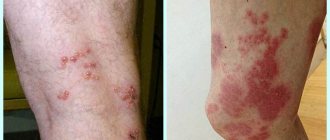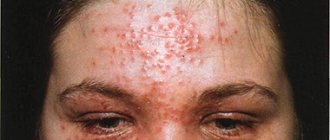One of the insidious ailments of humanity is the herpes virus type 4. It is characterized by damage to the lymphatic system. Another name is the Epstein-Barr virus or EBV, which comes from the names of the scientists who identified this strain and described it.
After the virus enters the human body, infectious mononucleosis develops.
This viral disease is considered one of the most widespread among the population of our planet. Mostly occurs in a mild or erased form, which excludes the presence of corresponding symptoms.
Today, type 4 of the herpes virus remains not fully understood. It interests doctors in various fields, from pediatricians to oncologists, because it causes damage to the palatine and pharyngeal tonsils, affects the condition of the liver, spleen, and blood composition. And as it was found, the presence of the fourth type of herpes virus in the body significantly increases the risk of cancer.
The insidiousness of the virus and the routes of its transmission. It easily infects a healthy person from a carrier, as it is transmitted through contact and airborne droplets. Infection is also possible during a blood transfusion.
Epstein-Barr virus, like other types, is not completely curable. After entering the body, it remains there for life, settling deep into the structure of the cells of the oropharynx and blood.
It manifests itself in different ways. After the age of forty, the disease is most often asymptomatic. But older people already suffer from infectious mononucleosis. After the initial infection, the human body develops lifelong immunity. But there are cases when the virus goes from a “dormant” state to an active one, and then aggravated manifestations of the infection are possible. This happens if a person has problems with the immune system, has suffered severe stress, or has been treated with immunosuppressants.
What it is
Herpes type 4 is a disease that occurs when the body is infected with the Epstein-Barr virus. The infection usually spreads to the lymphatic system, causing mononucleosis.
On this topic
- Herpes
All about herpes simplex
- Irina Nasredinovna Nachoeva
- September 24, 2020
In some cases, oncological processes develop:
- Nasopharyngeal carcinoma.
- lymphoma .
The latest research has proven that the virus affects the occurrence of chronic fatigue. When it is reactivated, a depressing effect on the body is observed, as a result of which a person feels constantly tired and overwhelmed. This condition does not go away even after rest and sleep.
The development of multiple sclerosis is associated with herpes of this type, when the virus re-enters the brain with lymphocyte cells.
The incubation period can last from 5 to 46 days.
Primary infection with herpes type 4 can occur in several forms, on which the symptoms depend:
- Subclinical. It is characterized by not particularly pronounced signs of the disease.
- Visceral. With it, the Epstein-Barr virus affects organs and their systems.
- Erased. There are minimal manifestations of symptoms, possibly asymptomatic.
Most often, in patients over 40 years of age, the disease occurs without significant symptoms. If the infection is primary, infectious mononucleosis usually occurs. People who have had the disease develop lifelong immunity.
Causes of the pathological condition
The carrier of the herpes virus is a person. It is from the patient that the herpes virus is transmitted to healthy people. It is important to remember that you can become infected even several months after contracting the disease.
Experts identify several routes of infection:
- Airborne. The virus is transmitted through saliva during coughing when a healthy person inhales contaminated air.
- Contact. Infection occurs through the use of patient objects (towels, dishes), oral sex and kissing.
- Transfusion. Infection is possible through blood transfusion.
On this topic
- Herpes
All about the blood test for herpes
- Irina Nasredinovna Nachoeva
- September 24, 2020
After suffering from mononucleosis, the Epstein-Barr virus remains in a latent form in the body. Usually, re-development of the disease is not observed, but herpes can reactivate, manifesting itself in different ways. The occurrence of this condition is influenced by the following factors:
- stressful situations;
- hypothermia;
- use of certain medications .
The reasons that provoke the development of Burkitt's lymphoma include:
- genetic pathologies;
- AIDS;
- weakened immune system.
Other immunodeficiency states can also affect the development of oncological processes.
Features of the virus
A person can become infected with the Zoster virus mainly only once, but there are exceptions. The Herpes virus, which belongs to type 3, consists of two diseases: chickenpox and shingles.
Both stages require timely and correct treatment, otherwise the disease will progress, acquiring a more complicated form.
Symptoms of the disease
The symptoms of herpes type 4 depend on the disease caused by the virus.
Infectious mononucleosis
Initially, the disease manifests itself as decreased appetite, weakness and mild fever. At further stages, the disease is characterized by signs of ulcerative necrotic or catarrhal tonsillitis. In this case, fibrous films appear in the patient’s oral cavity.
Type 4 herpes is accompanied by the following symptoms:
- muscle pain;
- dizziness;
- gagging ;
- loss of appetite;
- drowsiness;
- swelling of the pharynx;
- nasal congestion
- headache ;
- sweating;
- hyperemia of the oropharyngeal mucosa;
- general weakness;
- high temperature (up to 40 degrees);
- decreased performance.
These symptoms can easily be confused with a sore throat or pharyngitis. Such signs are observed in the first stages of the disease (on the second to fourth days after infection).
Enlarged lymph nodes are also considered an important symptom when diagnosing pathology. Their compaction, mobility, and pain on palpation are observed. Lymphadenopathy spreads to the submandibular, posterior cervical, and sometimes inguinal nodes.
In some cases, hemorrhagic (subcutaneous hemorrhages in the form of dots) or urticarial rashes (itchy pink blisters) appear on the skin and mucous membranes.
Internal organs also suffer - the spleen and liver become significantly enlarged. In this case, patients experience a change in the shade of urine and yellowness of the sclera of the eyes. These signs are observed for a long time - almost up to one month.
Burkitt's lymphoma
According to statistics, the disease is a common complication of infection with the Epstein-Barr virus. This pathology is accompanied by hyperthermia and increased sweating.
The disease is characterized by the formation of multiple or single tumors on the jaw. Burkitt's lymphoma causes difficulty swallowing, shortness of breath, weight loss, and tooth loss.
There are two forms of this disease:
- Generalized. The oncological process spreads to the spinal cord and spine. It manifests itself as a violation of motor coordination and decreased sensitivity of the legs and arms.
- The abdominal form, which affects the digestive organs (liver, intestines, pancreas). With pathology, dyspeptic disorders and pain in the abdominal area occur. Intestinal obstruction and ascites may develop.
The disease occurs in four stages. In the final stages, bone tissue and the nervous system are affected.
Nasopharyngeal carcinoma
With this pathological condition the following symptoms occur:
- difficulty breathing through the nose;
- noise and ringing in the ears;
- loss ;
- purulent nasal discharge with bloody clots;
- headache .
If symptoms of mononullosis and malignant processes appear, it is important to consult a specialist in a timely manner. After diagnosis, appropriate treatment is prescribed that will help prevent unwanted consequences and alleviate the patient’s condition.
Diagnostic methods
First, the specialist collects anamnesis and examines the patient. To confirm or refute the diagnosis, the doctor gives a referral for laboratory tests. Such studies include:
- analysis . Infection is indicated by an increased level of lymphocytes, the presence of band neutrophils and mononuclear cells. AST and ALT levels above normal indicate that the liver is damaged.
- Polymerase chain reaction of saliva or blood. This method determines the presence of a virus.
- Immunofluorescence study. Allows you to detect antibodies to the pathogen in the blood.
Ultrasound diagnostics is considered an additional diagnostic method. It is done in order to determine damage to the digestive organs and lymph nodes.
If you have infectious mononucleosis, you should be tested three times for antibodies to HIV. This analysis is carried out during an exacerbation of the disease, after three months and six months. The need for such a diagnosis is explained by the fact that HIV in the initial stages has similar symptoms to herpes type 4.
If a specialist suspects cancer, he may prescribe a biopsy.
Diagnostic measures
Infectious diseases caused by herpes type 3 are characterized by the development of specific symptoms. Therefore, the doctor usually makes a diagnosis based on a visual examination. However, in some cases, confirmation of the diagnosis is required using the following methods:
- conducting microscopy of cerebrospinal fluid and blood: the appearance of specific multinucleated cells;
- blood serum examination: the titer of antiviral antibodies increases;
- appointment of PCR. The method allows you to determine the DNA of the virus. The material for research is taken from vesicles.
Traditional treatment of herpes type 4
Treatment is aimed at eliminating the symptoms of herpes and strengthening the immune system. For the disease, the following groups of medications are used:
- Antiseptic solutions. Used for gargling.
- Antibacterial agents. Used in case of bacterial infection. Depending on the pathogen, antibiotics of the macrolide, penicillin or cephalosporin group are prescribed.
- Antiviral drugs. Prescribed to reduce the growth and reproduction of the virus in the body. The most commonly used are Acyclovir, Famciclovir or Valaciclovir for internal use.
- Antipyretic drugs. Use when the patient's temperature is above 39 degrees. It is not recommended to take Paracetamol or Aspirin so as not to cause liver dysfunction.
- Glucocorticosteroids. Hormonal medications are needed for severe swelling of the pharynx and severe inflammation.
In addition, detoxification therapy is mandatory. It consists of drinking more fluid (at least 2 liters per day). In severe cases, the patient is administered glucose or water-salt solutions. This ensures the elimination of symptoms of intoxication due to herpes, improving metabolic processes.
For nasopharyngeal carcinoma, radiation treatment and chemotherapy are used.
If the patient has Burkitt's lymphoma, then antiviral drugs and antitumor agents are prescribed.
On this topic
- Herpes
All about herpes virus type 2
- Irina Nasredinovna Nachoeva
- September 3, 2020
Drug treatment is prescribed only by a qualified doctor. Self-medication can aggravate the problem and provoke the development of complications.
For these diseases, bed rest and limitation of physical activity are indicated. You also need a special diet, which includes eating healthy foods and limiting the intake of junk food.
Possible complications
Undesirable consequences for type 4 herpes occur in rare cases, usually when treatment is not provided in a timely manner.
Most often, the disease can be complicated by the addition of a bacterial infection (streptococci and staphylococci). In this case, the central nervous system organs are affected. The consequences of this are considered to be the following pathological conditions:
- convulsions;
- meningitis;
- dysfunction of brain structures;
- depression;
- multiple sclerosis;
- hallucinations.
In some cases, Bell's palsy may develop. With this pathology, the nerves of the face are affected. This condition is accompanied by impaired vision, hearing and taste sensitivity.
On this topic
- Herpes
The best methods for treating herpes on the buttock
- Inna Viktorovna Zhikhoreva
- August 16, 2020
In addition to the nervous system, complications can spread to the heart, respiratory and digestive organs. In this case, dangerous complications are considered:
- hepatitis;
- splenic rupture;
- myocarditis;
- lung abscess.
Some of these pathologies often lead to death.
As a consequence of an untreated disease, damage to the internal organs that produce the secretions necessary for the body. These include pancreatitis, orchitis or mumps.
Chicken pox
Chickenpox is considered the most common disease in children; the infection has a long incubation period. The first signs of chickenpox appear 2-3 weeks after infection. The disease has an acute onset with the development of a febrile syndrome, the rash quickly spreads throughout the body. Chicken pox in adults has a more severe course, often accompanied by the development of dangerous complications - damage to the nervous system, mucous membranes, heart and lungs. Primary infection during pregnancy can lead to intrauterine fetal death.
Prevention measures
Herpes type 4 is easier to prevent than to treat. Therefore, in order to prevent infection with the Epstein-Barr virus, it is important to follow the following preventive measures:
- Avoid close contact with patients with mononucleosis.
- donors carefully .
- Observe hygiene rules.
- properly and balanced .
- Strengthen the immune system (through the use of vitamins, hardening, physical procedures).
On this topic
- Herpes
All about herpes on the lower back
- Inna Viktorovna Zhikhoreva
- August 16, 2020
For the purpose of prevention, it is necessary to undergo annual medical examinations and studies.
To prevent reactivation of the virus, you must adhere to the following recommendations:
- Avoid hypothermia.
- Take medications in the exact dosage, without exceeding the norm.
- Avoid stressful situations and psycho-emotional stress.
If you follow these rules regularly, you can reduce the risk of infection with the Epstein-Barr virus several times.
Herpes type 4 is a dangerous condition in which a specific Epstein-Barr virus causes serious illnesses (infectious mononucleosis, nasopharyngeal carcinoma and other pathologies). These diseases develop severe symptoms, which in some cases leads to various complications.
Various medications are used to treat diseases. It is also important to follow preventive measures to avoid infection and reactivation of the virus.
Preventive actions
After entering the body, the herpes virus parasitizes inside nerve cells and ganglia and is inaccessible to drugs. Therefore, the main direction of disease prevention is strengthening the body’s protective properties and hardening.
Immunization can be used as a specific means of preventing herpes virus infection. Vaccinations are strongly recommended for children before entering preschool, and for elderly patients with weakened immune systems.
Additionally, experts recommend following the following rules:
- after contact with skin affected by herpes, wash your hands thoroughly with soap;
- use only personal hygiene products;
- do not touch blisters and wounds on the skin;
- Regularly eat foods rich in vitamins and minerals.
Herpes Zoster is an insidious virus that causes chickenpox or shingles. At the moment, it is impossible to completely cure the disease, but strengthening the immune system can reduce the risk of recurrent infection.
Similar articles:
- Symptoms and treatments for herpes zoster (shingles)
- Herpetic encephalitis
- Herpes type 4
- Genital herpes in men
Great article 0











